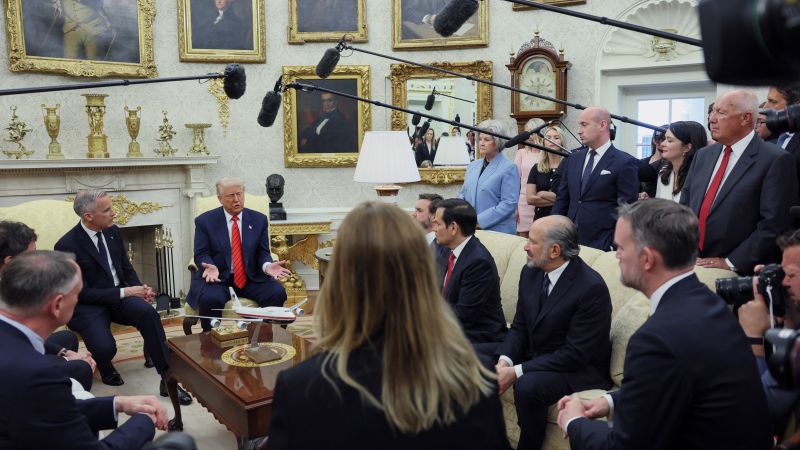On a recent episode of Donald Trump’s reality TV show inspired presidency, viewers were teased with the promise of “a very, very big announcement… like, as big as it gets,” expected to surface soon. Trump maintained a mysterious tone during a press conference in the Oval Office, hinting at significant news but withholding specifics. He promised this announcement would be one of the most crucial declarations concerning an important subject made in years, igniting intrigue among reporters and the public alike.
During the same conference, Trump suggested that this monumental revelation might relate to a trade deal. Yet, he quickly added the caveat that it might not be about trade at all. His comments at a Milken Institute event reinforced the idea that the announcement was not trade-related, describing it as a “truly earth-shattering and positive development for this country.” The announcement is expected imminently, potentially by Thursday, Friday, or the following Monday.
His theatrical approach, reminiscent of network television promos, created an atmosphere ripe for speculation as he hosted the newly elected, calm Canadian Prime Minister Mark Carney. Trump’s declaration stirred both amusement and anticipation, embedding a sense of suspense akin to a cliffhanger in a TV series—“Stay tuned, America — what happens next will blow your mind!” This ongoing saga reflects Trump and his advisors’ carefully orchestrated narrative in recent weeks, urging Americans to trust them, asserting that impending deals will bring relief from the economic challenges citizens face.
However, the sincerity of this narrative is beginning to wane as reality sets in. Businesses and constituents are growing increasingly skeptical, and trust in Trump’s administration is dwindling daily. As of late, the White House has not produced any trade deals, concepts, or tangible actions since the imposition of tariffs and increased trade restrictions. Despite Trump’s claims of a conversation with Chinese President Xi Jinping regarding trade negotiations, Treasury Secretary Scott Bessent contradicted this assertion under oath, highlighting the lack of progress in those talks. Adding to the chaos, Trump surprisingly proposed 100% tariffs on films made abroad, which could potentially extend the trade war to services, deviating from the initial focus on goods.
Business leaders, understandably, are apprehensive under these uncertain conditions. They are left to navigate an unpredictable landscape dictated by tariffs and whimsical policy shifts. Particularly concerning is the sharp decline in cargo arriving from China, with importers opting to cancel shipments rather than bear the burdensome tariffs. The port of Los Angeles has reported a staggering 50% reduction in incoming cargo from China, signaling looming shortages and elevated prices for certain consumer goods in the near future.
As this scenario unfolds, Americans brace for the impact of unpredictable trade measures and the imminent price hikes on various goods. The prospect of significant trade deals remains distant, further raising questions about whether the so-called dealmaker-in-chief genuinely seeks to forge agreements or is simply interested in the drama of negotiations.
During a meeting with Prime Minister Carney, Trump expressed a desire for others to stop pressing him about the quantity of deals being signed, indicating a level of disengagement from accountability concerning his trade promises. His rationale suggested a dismissive attitude towards the seriousness of trade negotiations, implying that if deals do not emerge, any failure will rest on external factors rather than his decisions.
The conversation took an interesting turn when a journalist inquired whether any remarks from the Canadian leader could entice Trump to reconsider the tariffs on Canadian products. Trump’s emphatic “No” followed by, “Just the way it is,” underscores a rigidity that has become his trademark approach. This response, rooted in a fundamentally flawed perception of Canada’s trade practices, reveals a disconnect between Trump’s policies and the realities of the long-standing beneficial trade relationships between the US and Canada.
Contrary to Trump’s narrative of exploitation, decades of mutual cooperation have created a balanced and relatively small trade deficit with Canada. Furthermore, Trump’s portrayal of trade with Canada as an adversarial scenario ignores the critical dependence of the US auto industry on collaborative trade practices with both Canada and Mexico.
As the economic landscape contracts and the US’s credibility in global finance wobbles, Americans are left to ponder whether Trump’s actions stem from a genuine desire to resolve trade issues or a continued fixation on the theatrics of his presidency. The blurring of these values highlights a reality that starkly contrasts with the optimistic illusion presented in the world of reality television that Trump seems to inhabit.



